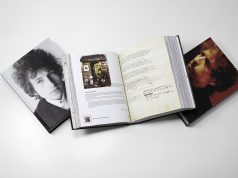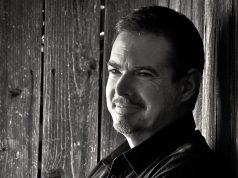
It’s hard to keep up with modern technology, especially when the Internet constantly pops out a new platform to be obsessed with, each one shortening our attention span with every click.
“Now the kids I know are into this thing called Vine, which is a six-second thing. Six seconds!” says Arsen Kashkashian, head buyer for the Boulder Book Store. “I think people realize that sometimes they’re on this train, and they can’t get off.”
In an effort to slow down the train, Kashkashian has partnered with KGNU News Director Maeve Conran to start the KGNU Radio Book Club. Book lovers, newcomers and everyone in between are welcome to read along and call in. Every month Kashkashian chooses a book, then he and Conran host a radio show along with the author to talk about the book. On Aug. 20, they’ll discuss last month’s book, The Painter by Peter Heller. And because each radio show gets archived, there’s no scheduling pressure that other book clubs can cause.
“The reason I wasn’t a member of one before was because I just got too busy with kids and family,” Conran says. “So I didn’t have time to go some where for two hours once a month to do it. But people can tune into the radio, and they can read along, and you can have that sense of community and collective reading experience.”
So far, the book club has featured mostly local writers, providing insight into the talent in our own backyard.
“What’s been great for me is to see the wealth of local authors that we have,” she says. “It’s a hotspot for really talented authors.”
The club has featured mostly fiction selections, which was a surprise to Kashkashian, who anticipated choosing more nonfiction. But, he says, fiction allows them to approach a topic from a new perspective.
“We do a lot of public affairs programming and a lot of political books and discussion like that, and I think we all need to have that antidote,” Conran says. “Because fiction writers can explain these issues in a different way that stimulates different parts of your brain through that storytelling and that narrative structure, so we’re not bombarded.
“Like with [June’s selection] The Wives of Los Alamos, we had discussion on the creation of the nuclear bomb,” she says. “We’ve had discussions on that but in a much more analytical and scientific, historical, political way. But to have that discussion through the prism of this fiction book is a completely different experience and very valuable as well.”
Fiction also allows for a conversation about writing and the author’s approach.
“Often, the author has spent a long time either studying a specific subject or something, so they have a certain amount of expertise, or they’re coming at it at a certain angle that might be different than an academic in that particular discipline,” Kashkashian says. “But I also do want to talk about fiction in terms of how did you decide to write a novel and how did you decide to tell the novel in this way, or why are you using this language?
“I want to do both: what is the subject, what do you know about the subject, how does it relate to the world today, but also, you are an artist, and why are you telling the story in this way?”
Conran says the approach is also great for people who want to break out of their genres and read something unfamiliar. And the club’s gotten good response from listeners.
“I got a phone call from a listener after our last show who was like, ‘OK, you’ve done it to me. I gave up reading fiction five years ago … but you guys have got me reading fiction again. So thanks very much,’” she says. “It was a really nice indication that, first of all, we’re engaging with the listeners. And there’s a lot to talk about around the subject matter, we’re not just talking about this fiction story. There’s so much behind it and so much to really engage with. It’s introducing audiences to fiction in a way that they can really get their teeth into.”
The real effectiveness of the program stems from the community aspect that links people together with a common goal. Like any book club, people from various backgrounds get together to dissect their interpretations of the work.
“You get something different out of it when you hear other people in discussion,” Conran says. “The idea that everyone else is reading along with you, that’s why it’s so great for a community radio station. It taps into the community enjoyment of doing something collectively.”
“Plus, you tend to read more carefully when you know you’re going to discuss the book,” Kashkashian adds. “And I think once you get to the group, people come with all their different life experiences and they bring something different to the reading than maybe you brought. I do find usually I appreciate the book more after the book club discussion than maybe I did on my own.”
The next selection for the KGNU book club is Laura Pritchett’s Red Lightning, with a show on Sept. 24.
ON THE BILL: 9 a.m. August Book Club with Peter Heller. KGNU 88.5 FM and 1390 AM or at kgnu.com/bookclub














